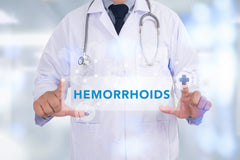Can Hemorrhoids Kill You? Discover if Your Hemorrhoids Are Life Threatening
Posted on 27 June 2018 by Maryanne Johnson
Share this post
Are you worried that hemorrhoids can kill you? If you are noticing small bumps, sharp or throbbing pain, and bright red blood on your stools or after wiping, then chances are, you are experiencing the typical symptoms of hemorrhoids.
This may be alarming when things aren't entirely normal in your anal-rectal area, but surprisingly, nearly half of adults who are 50 years of age or old experience hemorrhoids.
Hemorrhoids affect 10 million Americans each year, and if you have never had hemorrhoids before, you may be wondering if this is a severe or even deadly matter.
Hemorrhoids are just like any other condition, if you catch it early enough, they are manageable and go away quickly by themselves or even with a few at-home treatments.
In discussing hemorrhoids, you should understand that the term “hemorrhoids” refers to your veins that are located inside the rectum and anal canal, as well as beneath the skin around the anus. Many variables can cause these veins to swell, become irritated, and inflame.
The inflammation of these interior and exterior veins produce hemorrhoid symptoms.
If you have hemorrhoids, you may notice these symptoms:
-Itching on or near the anus
-Throbbing pain during movement and in certain positions
-Bleeding, either bright blood covering the stools or after a bowel movement
-Discharge or fecal matter from the anus
-Small to large bumps that have formed around or directly on the anal opening
Regardless of whether or not you tend to be an over-thinker or a hypochondriac, anyone experiencing these symptoms for the first time is bound to feel perturbed.
The good news is that hemorrhoids are incredibly unlikely to kill you, but the warning is that you should see your doctor before they become worse, because complications are known to arise if treatment is not quickly implemented.
Are Hemorrhoids Life Threatening?
Two concerns can occur in either type of hemorrhoid—internal or external. When addressed early on, treatment and prevention methods can be put in place to help subside the worsening of symptoms and abate flare-ups.
For external hemorrhoids, this complication is known as thrombosis. Thrombosed hemorrhoids are the formation of a blood clot that has become trapped inside the pocket of the already inflamed and irritated veins and blood vessels.
Visibly, there is still the small, tender bump, but when thrombosis has occurred; the bump turns a bluish color to signify the trapped blood.
Thrombosed hemorrhoids are painful, even more so than standard external hemorrhoids. Blood clots won't kill you, but you should have them lanced and drained by a medical professional to lessen the risk of infection and to save yourself from the pain.
Doctors and scientists note internal hemorrhoids by their stages of prolapse. Yes, internal hemorrhoids can prolapse and elongate outside of the rectum, but no, this will not kill you either.
Many people notice internal hemorrhoids by the sign of rectal bleeding, which is painless due to the lack of pain-sensing nerves in the lower part of the rectum.
The complication lies in the how much these internal hemorrhoids have prolapsed through the anal opening and are measurably visible. A prolapsed hemorrhoid is not fatal, but treatments need to be applied before even further issues occur, like a rectal prolapse.
Complications of hemorrhoids are unnecessary due to the numerous perfected and tested treatments available. Even with aggressive surgeries, there is an extraordinarily low risk of infections and other issues post-procedure.
Consider seeing a hemorrhoid physician if your hemorrhoids involve one of the following complications.
When Rectal Hemorrhoid Bleeding Does Not Subside
Rectal bleeding is not considered normal, but chances are it is a sign of a benign gastrointestinal issue like hemorrhoids. Tell your doctor if you have had rectal bleeding, even if it is from the widely experienced, non-fatal disease of inflamed hemorrhoids.
Depending on your age, gastrointestinal genetic family history, and yearly examinations, your doctor may want to run additional tests to be certain that the rectal bleeding is in fact from hemorrhoids.
Visiting your doctor is especially crucial if your rectal bleeding does not subside in a few days. This could be an indication of another condition or factor at work that needs medical attention.
Some colorectal cancers share similar symptoms, such as rectal bleeding, to those of hemorrhoids, and while the likelihood is dramatically lower that cancer is present, it never hurts to check with your doctor just in case. Again, leave it to your doctor to determine what the culmination of your symptoms mean for your condition and if any further examinations are needed.
When Your Hemorrhoids Are Painful and Uncomfortable
Don't let yourself suffer from the pain of hemorrhoids. Your doctor is there for a reason, and with one visit, he or she can set you on the right track for feeling better and pain-free.
There could be an easy solution in dealing with your hemorrhoids and even in preventing future flare-ups from occurring. It could be simple additive of a stool softener or also a dietary fiber supplement.
What this method does is target stools to bulk them while drawing in moisture, all to curb straining and constipation while passing a bowel movement. Constipation is one of the most common factors behind vein inflammation and hemorrhoid symptoms.
Your doctor can also provide you with recommendations of hemorrhoid ointments and creams that target common symptoms of hemorrhoids like that burning feeling you may have, or intense anal itching.
When Over the Counter Treatment Isn’t Enough
If you have hemorrhoids and are taking over the counter remedies, like hemorrhoid ointments, pain relievers like Advil or Tylenol, or even hemorrhoid pills or supplements that target hemorrhoids for optimal relief, then it is time look at HemRid Max.
Hemorrhoids go away on by themselves within a few days, even without treatment. If this does not appear to be the case with your hemorrhoids, then medical intervention is required.
There are plenty of treatments available for hemorrhoids, so don’t ignore the signs that your body is trying to communicate with you, and don’t make yourself live in a world of discomfort and pain.
Because hemorrhoids share similar symptoms with certain colorectal cancers, this warrants an appointment with your doctor because your body could be indicating that there is another condition at play.
Solving your hemorrhoid issues when they are still mild will save you time, money, and pain down the road. Hemorrhoids tend to become worse when they are ignored, and no means of prevention or treatment has been enacted.
Severe Hemorrhoids Could Require Aggressive Treatment
Untreated hemorrhoids can become a serious matter, and although even at their severe stages they are not considered to be fatal, enlarged, prolapsed, and thrombosed hemorrhoids can deter your daily activities and make life uncomfortable.
Even with hemorrhoids becoming life hindering, enlarged, or prolapsed, there are surgical options that can remove them.
Hemorrhoidectomy, rubber band ligation therapy, sclerotherapy, and many other treatments that are operative and non-operative can be safe and effective for the most severe cases of hemorrhoids.
Can Hemorrhoids Be Fatal?
Hemorrhoids are not known to be a fatal disease. These inflamed veins have been nothing more than an annoyance to both men and women for as long as humans have been around, so much so, that half of adults experience them in their lifetimes.
Hemorrhoid flare-ups and their associated symptoms can be contained and prevented, and much like any other health concerns, hemorrhoids can successfully be stopped when caught in their early stages.
After surgeries, or when thrombosed hemorrhoid ruptures, there can be a risk of infection. Untreated infections can lead to several issues, and there is a small percentage of fatality, just like any other surgeries or open wounds that are not adequately cleaned.
Keeping an open line of communication with your doctor is a crucial step in preventing these issues from happening. Your doctor will advise you to report any abnormalities and look out for certain symptoms that could be adverse in your recovery process.
Try this #1 hemorrhoid supplement called HemRid Max. It works fast to provide long-term relief from hemorrhoids.
Only 3.5 million people out of 10 million seek medical treatment for their hemorrhoids. Telling your doctor your symptoms is one of the essential things to do, especially if you spot rectal bleeding because while hemorrhoids are not fatal, colorectal cancer can be.
Conclusion
Hemorrhoids may be common and equally frustrating, but there is little chance that they become a fatal condition.
Hemorrhoids can experience complications that may eventually require surgeries or procedures to get them under control but rarely does this disease result in fatalities.
However, rectal bleeding should not be assumed to be derivative of hemorrhoids, and an assumption may result in a delayed diagnosis of a more severe condition.






0 comments